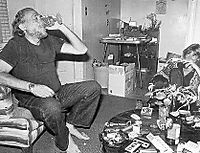
It’s somewhat ironic that on the same night I read a new poem entitled “On the 89th Day, I Quit“, I end up drinking way more than usual. The show ended rather early last night but a few of us ended up sticking around instead of going to Reservoir and Maureen’s hand got a little bit heavier with each drink.
Ugh.
I’m too old for this shit!
The poem came from an interesting writing exercise Marty sent me yesterday, as I wanted to continue my streak of reading something new every time I go to 13 — up to six times now — but none of the ideas currently rattling around in my head were quite ready to blossom.
stanza 1: reject something.
stanza 2: invoke a god.
3: retract the rejection.
4: include a line from a song you haven’t heard in years.*
5: talk about a time you were kissed or cursed.
6: write a curse.
7: apologize for the rejection.
8: retract the apology.
9: write a blessing for the rejected.
It’s almost like a Mad Lib, and it was interesting the way the poem unfolded as I went stanza by stanza without any planned direction or ending, like a one-person exquisite corpse. I generally don’t like writing exercises because they’re often too vague, but Marty and Oscar have both come up with some really interesting ones, and the last time around Oscar’s Oulipo exercise indirectly resulted in “Bittersweet Reunion” which is the poem that was just published in The November 3rd Club.
So, to recap: writing = good; drinking = bad. Separating the two eventually before my liver falls out = priceless.
* 10 points if you can name the song.
Read and post comments |
Send to a friend
Do you like email?
Sign up here to get my bi-weekly "newsletter" and/or receive every new blog post delivered right to your inbox. (Burner emails are fine. I get it!)

